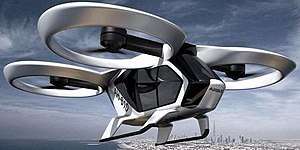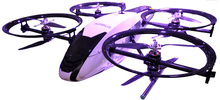Airbus CityAirbus
| CityAirbus | |
|---|---|
 | |
| Role | electric helicopter project |
| National origin | Multi-national |
| Manufacturer | Airbus Helicopters |
| First flight | pending, planned for the end of 2018, manned: 2019.[1] |
| Introduction | planned for 2023[2] |
| Status | Under development |
The Airbus CityAirbus is a multinational project by Airbus Helicopters to produce an electrically-powered VTOL aircraft demonstrator. It is intended for the air taxi role, to avoid ground traffic congestion.[3]
Development

The CityAirbus follows other Airbus Urban Air Mobility initiatives: Skyways to deliver packages by UAVs on the University of Singapore campus, the A³ Vahana single-passenger, self-piloted VTOL aircraft and the A³ Voom on-demand shared helicopter booking service app by A³.[3]
A 2015 feasibility study confirmed the design's operating costs and that it could meet safety requirements. Full-scale testing of the ducted propeller drivetrain was completed in October 2017. Type certification and commercial introduction are planned for 2023.[2]
The iron bird systems test prototype was completed and powered on in December 2017 on a test bench in Taufkirchen, Germany, to test the propulsion system chain, flight controls and propeller dynamic loads, verifying the electric, mechanical and thermal dynamics before being installed on the flight demonstrator by mid-2018.[4]
The first structural parts for the demonstrator were produced by Airbus Helicopters. The aircraft's first unmanned flight is scheduled for the end of 2018 with manned flights following in 2019.[1]
Design
The multirotor is intended to carry four passengers, with a pilot initially and to become self-piloted when regulations allow. The overall system is being developed in Donauwörth, with the electrical propulsion system built in Ottobrunn/Munich. The use of four ducted fans contribute to safety and low acoustic footprint. The fully integrated drivetrain has eight propellers and eight 100 kW (130 hp) Siemens SP200D direct-drive electric motors. The fixed pitch propellers are controlled by their RPM. The four electric batteries total 110 kWh (400 MJ) and can produce a combined output four times 140 kW (190 hp). The design should cruise at 120 km/h (65 kn) on fixed routes with 15 minutes endurance.[2]
Specifications
.jpg)
.jpg)
Data from Airbus[2]
General characteristics
- Crew: 1 optional
- Capacity: 4 passengers
- Fuel capacity: 110 kWh
- Powerplant: 8 × electric ducted fan, 100 kW (130 hp) each , 4 × 140 kW (190 hp) batteries
Performance
- Cruise speed: 120 km/h (75 mph; 65 kn)
- Endurance: 15 minutes
References
- 1 2 Dominic Perry (20 Dec 2017). "Airbus Helicopters powers up CityAirbus 'iron bird' rig". Flightglobal.
- 1 2 3 4 "CityAirbus demonstrator passes major propulsion testing milestone" (Press release). Airbus. 3 October 2017.
- 1 2 "CityAirbus Backgrounder" (PDF). Airbus. June 2017.
- ↑ "Helicopters Iron Bird Power On: CityAirbus reaches next milestone" (Press release). Airbus. 19 December 2017.
External links
- Airbus Helicopters
- "Future of urban mobility" (Press release). Airbus. 6 December 2016.
- Graham Warwick (Mar 15, 2017). "Airbus Intensifies Work On Urban VTOL Air Transport". Aviation Week & Space Technology.
- Tony Osborne and Graham Warwick (Feb 23, 2018). "On-Demand Helicopter Experience Feeds Into Airbus Air Taxi Design". Aviation Week & Space Technology.